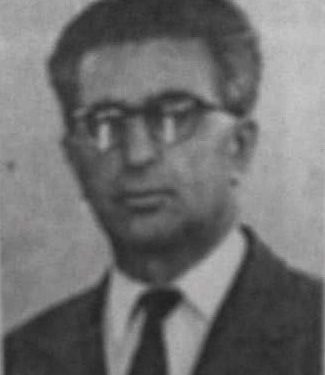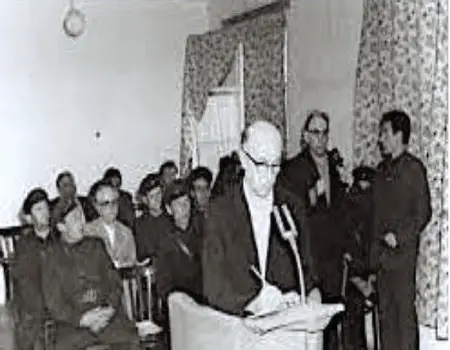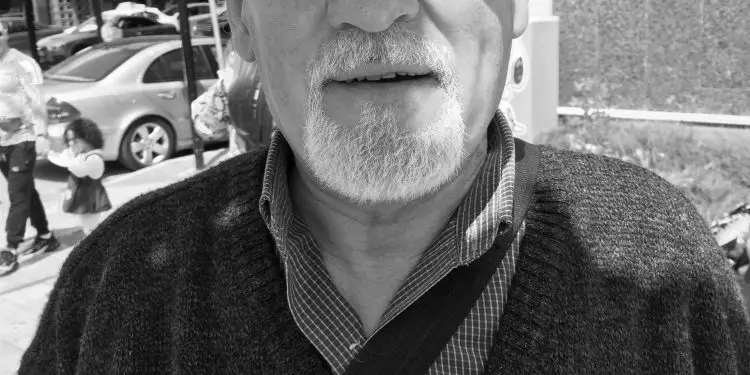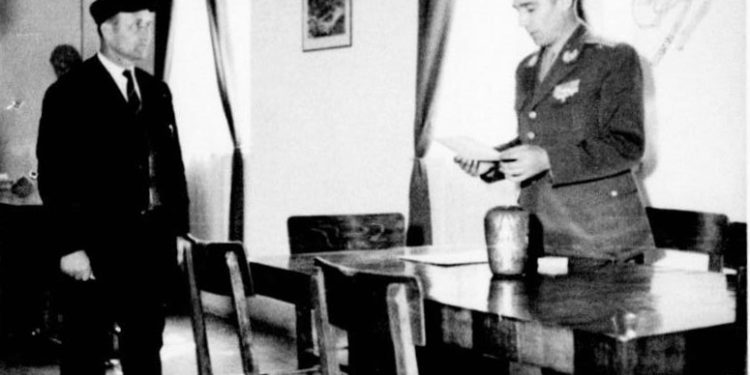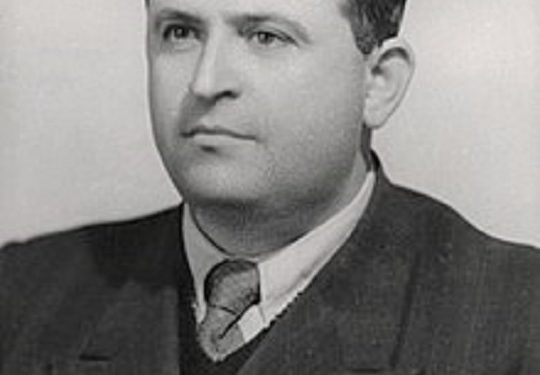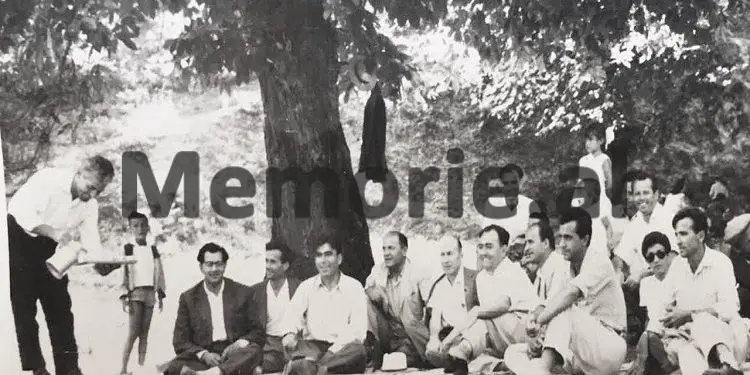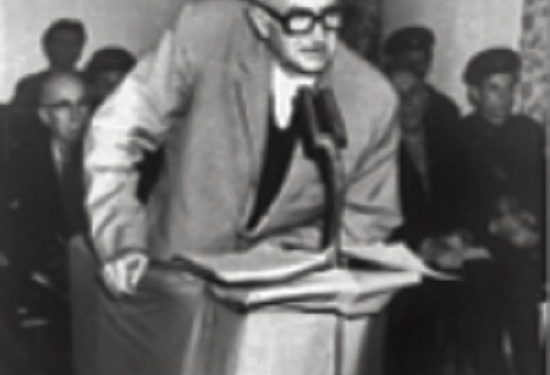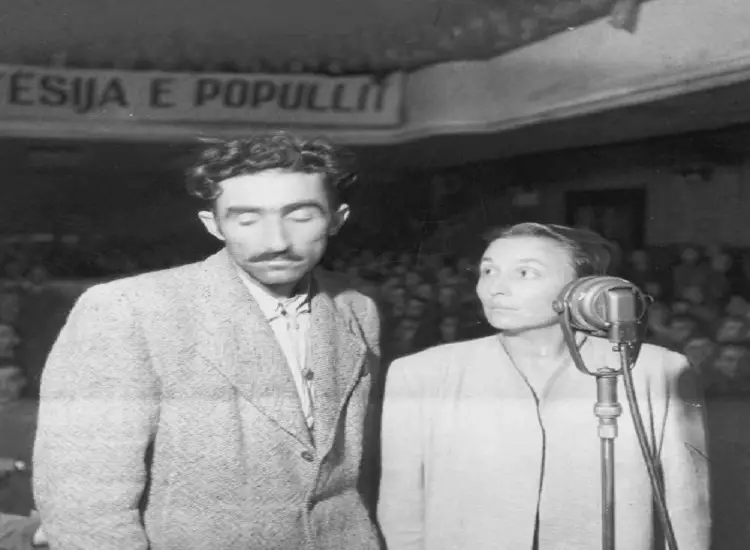By Astrit Jegeni
The second part
Memorie.al / Ahmet Jegeni, a senior official of the Enverist regime, held numerous party and power positions in that political system, among others he was the director of the port of Durrës for many years. Later, he started working at the Ministry of Foreign Trade and was appointed Secretary of the Party Organization of this Ministry, until he was arrested on the charge of “hostile activity” with the so-called Kiço Njjela’s group and friends, a charge he did not accept, for almost a year. The violence exercised in the communist investigation broke him and he writes this memoir, accepting the cooperation with the accusation, which at first he did not accept. In extreme personal physical and psychological conditions, he describes in writing himself, his colleagues, his family members according to the desire and the communist moral political mindset.
In my childhood memory, I have an image of a man of average height, slightly built, well-dressed in clothes bought outside Albania, dignified. On the street, and when he happened to meet my father, he greeted him with his head, but always with the appropriate distance and coldness, which stemmed from the fact that they belonged to two different political strata and opposite social positions. They were almost the same age, they were cousins, and they had been together in the partisan detachment of Dibra e Madhe, with Commander Haxhi Lleshin.
My father showed me moments from the surrender of the Italian army after the capitulation of Italy, and it was Ahmeti, who got into a “Caro-armato”, a car reinforced with thick sheet metal, and went himself to the Italian barracks of Dibra e Madhe, to negotiate with the Italian command there. My father begged and asked him not to go, because the Italians would kill him, but he was not afraid. After a few hours, the Italians accepted the agreement with Ahmet, they with their personal weapons and daily food, released their barracks to the partisans and headed towards Peshkopia.
In the endless conversations of my tribe, Ahmeti was treated with care, thanks to the fact that he was a high-ranking communist functionary, I believe it was Jegeni, who had the highest post in the communist regime, the absolute majority of Jegeni, were anti-communists. Another Jegeni with communist beliefs and who had high party and state functions was the son of my uncle, Eqerem Begut, Besnik Jegeni, but he had functions in Macedonia and we actually knew little, or nothing, about his real social weight.
However, Ahmeti was seen with sympathy, as a man who knew how to maintain a reasonable attitude of respect towards his tribe, who were generally labeled “reactionaries” by communist propaganda and mentality. Only in cases of death, Ahmeti appeared for the occasional visit, and these were very rare. We were in political exile, when we got the news that Ahmet was arrested, my father expressed regret, but that was all. He didn’t take it in his mouth, neither for better nor for worse.
Later, when we returned from exile, with Pranvera, Ahmet’s sister, who was in Tirana, we had endless and long conversations about Ahmet and his relationships with his family, about his mother who lived with Pranvera, and not with his son, his wife from the Strazimir tribe, Dhurata, sister, brother, who lived outside Albania, the nearby tribe, and my perspective on Ahmet changed.
I remember Mitrushi, his brother-in-law, “Hundelesh”, that’s what I called him because he had fur on his nose, a charming, cultured man, quite entertaining and very modern for the time, when he came to our house, he created a pleasant atmosphere. It was a pleasure to listen to that man. Unfortunately, Ahmet’s relations with his wife, mother and sister were, according to Pranvera, unpleasant and problematic. However, various acquaintances and strangers I met, when they asked me about my last name, the first subsequent question was; what is your relationship with Ahmet?
They all spoke well of him. When I got hold of this memo and read it, I was stunned, I didn’t like it and I was disappointed by Ahmet’s personality, I was surprised. Ylli Selenica, a good friend of mine, who was a political prisoner, told me, when he was alive, not to judge people from the data of the communist investigation, because it was a very violent body of justice and few people could to bear it, they were forced to accept whatever was imposed on you, it is enough for the torture to stop. However, I was very hesitant to make the memorandum public.
Morally, I did not like the figure of Ahmet. Sebep became a person who knew Ahmet to change his mind. In a debate with me, he spoke with superlatives about the figure of Ahmet Jegen, taking him to the limits of singing hymns. Annoyed and tired of the lack of a sense of reality for the human figures that people have in their subconscious, I decided to publish this memoir. What I am publishing is a small part of this memorandum and, perhaps, the most “famous” of the entire memorandum, which for me is extremely inappropriate, almost on the verge of shame.
The memorandum of Ahmet Jegen, made in the Enverist investigation, in the form of a manuscript, consists of 184 pages, it was written under conditions of violent physical and psychological dictation to the investigator. It is written on A-4 paper, of poor quality, locally made, written in black pencil, on both sides of the paper, most of the handwriting is in pencil about 80%, the rest in blue and red pen, a relatively fine handwriting, but clearly legible and free of spelling errors.
During the investigation, a part of this material, about 10-15%, was typed by the employees of the Investigation and given to read by Ahmet Jegeni, who in some places interfered with his writing, to clarify the sentence and to too self-willed, to burden himself more before the law. Indicator of psychological and physical submission to the violence that was done to him during the investigation. During its typing, some words were adapted from the dialect of Dibra e Madhe. in literary language, but without changing the meaning of the sentence. Some expressions and words are not correctly transcribed, but they have not deformed the logic of the sentence. It should be noted that for a long time, about a year, Ahmet Jegeni did not accept any of the accusations of the investigators, but after many months of physical and psychological violence, Ahmeti surrenders and accepts the accusation.
“For hostile activity” and begins to write his self-denouncing memoirs, which I believe were written not because he felt regret for his political and state activity, but because he completely surrendered from the great physical and psychological pressure, he hoped that he will come out alive from the hell of the communist investigation. He could have acted differently, but he didn’t. In reality, most of the political prisoners from the communist regime did not withstand the physical and psychological violence and surrendered and signed what the communist investigator wanted.
The handwritten manuscript bears the date 4.10.1976 and is signed by him, while the typewritten material has the same date, but is not signed. It should be noted that there is a discrepancy in time between the date of his arrest and the date when Ahmeti started writing these manuscripts. Ahmet Jegeni died in the investigator. According to medical records, death was caused by a heart attack. I am inclined to believe that his death came from the unbearable living conditions of the investigation and physical and psychological violence. His case did not go to trial. Legally, Ahmet Jegeni is considered innocent.
We are giving them to be read as they are written in the typewritten original, contrasting each line or proper name with the handwritten original. The memo for me is interesting, that apart from the general historical character that we are informed about, in this interesting memo, is the information we get from the very good trade relations between Albania and Yugoslavia. At this time, Yugoslavia was the second partner after China, in Albania’s trade volume, it should be noted that the Albanian-Chinese political and economic crisis had begun to have its effects on the country’s economy; the ironic fact is that we have a report of obliquely with Enverist hostile propaganda for Titism and very good trade relations with Yugoslavia.
Continues from last issue
The handwriting of the defendant Ahmet Jegeni
I became a member of the party in December 1942, when they communicated this to me I felt surprised, because I knew myself like this at the time, when Nazmi Rushiti was gathering us in Dibër. This shows that I did not know the organizational side and in fact in our cell, very shallow educational work was done because Zoi Themeli (cell secretary) was very little prepared from this side.
Qazim Prishtina (police commissioner), better prepared, dealt only with political information; therefore we did not have a clear understanding of these issues, only when someone came from the center (rarely), conversations were held to clarify Party issues and other announcements of this nature, therefore we did not have the necessary support to see the problems properly. Even later with the arrival of other comrades and when the battalion was formed, it seems to me that this side has limped.
In 1944 (August), Peshkopia was liberated, and in September Dibra. I went from the end of 1944, to see my family, and also in 1945. At this time, I met Nexhat Agolli there, who told me to move to work in Macedonia, he made this proposal to me a few months later in Tirana, he told me the same in Dibër, Aqif Lleshi, as well as others from Dibër, but as I said, I had decided to live in Albania.
At that time, the order came out that in Dibër, the Albanian flag should not be placed, but the Macedonian one, as well as the Macedonian shop signs, to tell you the truth, I felt a chill and this was not good for me, and when the people of Dibër complained to me, I told them to stay calm, that’s the same.
I thought that Yugoslavia, no matter how damaged by the war, was a big country, the party was experienced and as a country older than us, with some industry, etc., it would recover quickly and that an economic well-being would be established there faster than us, because we were a country that had been neglected by the regimes and that we were damaged, so we needed time!!
In 1945 (December), the elections for deputies were held and Sul Baholli and I were candidates in the same constituency. Sula won, but then word spread that he won, because he had organized, through his friends, propaganda against me, telling the people that Ahmeti had taken the soldiers from their sons. (In the commands of the country), of this nature, with which some time ago I was the commissioner of the Zerqan district and the secretary of the Government, the Zerqan district.
Kiço Ngjela also spoke to me about this issue, when I was called in February 1946, to the Central Committee, on the occasion of my transfer from Peshkopia to Tirana. Kiço Ngjela spoke to me against Sula several times. He once said: “Sula is good for opening channels, I don’t know anything else”!
The above fact, as well as the fact that in October 1943, Sula and Zeqi Agolli were disarmed in Dibër by Xhem Gostivari, and that no measures were taken against him, create in me the impression that Sula is known by his friends and I am not, if I had I did this, who knows what happened. This was a crooked thought and shows my lack of maturity, ambiguity and is also related to the worldview of “friendship”, meaning that is related to my social background, that is, the micro bourgeois meaning of the issue.
I did not look forward to my appointment, in 1946, at the Ministry of Economy, I did not like economic problems and I had expressed the desire to go for studies. This was not accepted and I had difficulty adjusting to the assigned work. Later in January 1947, I was appointed director of the Albanian-Yugoslav Society, import-export, for this Nako Spiro called me and told me that I should cooperate with the Yugoslavs, they are our friends.
I thought that in this case, I would benefit a lot in the commercial profession, by which I considered the Yugoslavs to be more skilled than me, in fact they were. Deputy Director Hreljonavič, was an economist and an experienced man, Ljubibrotici (branch head), an expert on livestock items, Detičeku (head of finance), likewise, and I felt my inferiority, so they have benefited to make things go well for Yugoslavia, exports from Albania were going well, while imports were slow to arrive.
I didn’t see this with the real eye, I didn’t dig deep to find the reasons, but I connected it to the fact that Yugoslavia has been damaged in industry, so they have difficulties to meet their needs and ours, and I didn’t see Yugoslav sabotage there, so that they left our economy at their mercy, I believed the words they said about difficulties and I didn’t see that we were also damaged, but we kept our commitments.
So I was subject to the influence of the Yugoslav influence, who worked in the society and the Yugoslav commercial representative, Harliek, who with flattery, kind words, caused me to lose my vigilance and I did not make these problems an issue. This is where my work of subjugation to the Yugoslav influence begins. I remember that once in 1947, Kiro Grigorov came to Tirana (it seemed to me that he was dealing with finances) and at a dinner given by the Yugoslav trade representation, he spoke about the care that Tito personally shows for Albania, for its economy.
I said that I agree, because we see it with our own eyes that I work with in the Albanian-Yugoslav society. In fact, the problem was that the Yugoslavs did not fulfill the contracts, so I showed them that I was not mature, I said words just to please them. Nako Spiro reprimanded me for this attitude, as he had complained about the failure of the Yugoslavs to fulfill their duties.
So, an unforgivable attitude for me, which was related to the belief that the Yugoslavs seriously want to help us, while the facts showed the opposite. The truth is that I also had friction with Deputy. The director, Hreljonovic, seemed to be trying to avoid me and I did not see this well, and I told this to both Nako Spiros and Vasil Kati, who was the chairman of the Albanian side, of the Administrative Council of the Society.
Both of them told me that I am the Director, but the work should not be aggravated, especially Vasil Kati, who had close ties with Horliček, I (trade representative), tell me that we do not know enough, to get close to the Yugoslavs and learn and there is no harm, we have a goal after all. This later (1967-’68), Kiço Ngjela told me that while cleaning his safe, he found a document, with which the Yugoslavs demanded my removal from the Albanian-Yugoslav society, as an unwanted element.
He said that he sent this to the Central Committee and it is important, because there were some obstacles in this direction, for your behavior in Tirana. I asked him why he said things from the past, he said that now we will make a proposal to the Chamber of Commerce. Vasil Kati later told me that when he was in Yugoslavia, he asked where the former commercial attache, Horliček and the Deputy Director worked, they told him, the first in the Netherlands, while the second in the USA, even, not had wanted to return to Yugoslavia.
Vasil Kati, therefore, has constantly kept me updated on Yugoslav issues. Even later, he brought me closer to the Yugoslavs, as in 1972, when the talks on the 1973 protocol were being held, asking me for lists of unsecured goods, in meetings with the Chamber of Commerce of Kosovo, sending me in May 1973, in Yugoslavia, for the mixed commission, at a time when this sector did not depend on me, but on the first Directorate, not to mention the cases from 1974-1975, when this sector depended on me.
Vasil Kati told me that, at the end of 1974, he met with a Kosovar merchant (Bora), who lives in Turkey, but traded with Yugoslavia, saying that he is ready to take on big jobs, as a direct from Yugoslavia, as well as with Turkey. Vasil Kati has been quite cordial with all Yugoslavs.
In 1974, when the Yugoslav trade delegation was here with Deputy Minister Glishig, he sent us to Fier for a visit and said that he would not come, when he came in the evening and left the next morning. Vasili told the Yugoslav Deputy Minister that he came to Castile for him, because he has respect and wants him to be satisfied. Being at the official lunch, after signing the protocol, Vasili said that; tomorrow for lunch, all Yugoslav specialists are invited by the Albanian Foreign Trade Company, as they are helping in the development of trade.
Likewise, Vasil Kati told me that Gogo Kozman and Festim Sina asked him if I keep in touch with my brother in Yugoslavia. All these cases, etc., show that Vasil Kati has approached me, he has taken an interest in the Durrës Party Committee, which people I hang out with, he has intervened in the Durrës Executive Committee, so that they do not remove me from the trade sector (there were a variant), has agreed to be appointed General Director of the ports and that there is a cleaner job and there are contacts with foreigners (steamers, commercial agencies, etc.)
All these attitudes of Vasil Kati have influenced me to respect him and regarding the relations with the Yugoslavs, to see them positively, adding the export-import goods, the entrances and exits of other specialists. I think that in this direction, Vasil Kati also had the opinion of Kiço Ngjela, because the latter, when I was going to Yugoslavia in May 1973, told me that if I met my brother I was thirsty. At that time, I didn’t know how deeply my brother was involved in the vile hostile activity towards our country (I learned this here in prison, during the investigation), so I didn’t prolong the conversation and told him: No, I’m going to work official and not personal! Memorie.al
The next issue follows




